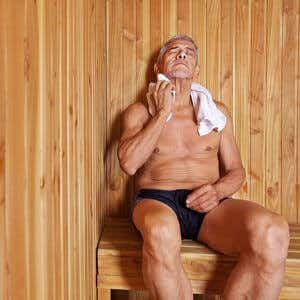
When most people think about sauna (pronounced SOW-nah) baths they imagine relaxing in a hot wooden room and sweating. But this Finnish tradition may pay unexpected dividends. There is growing evidence that a regular sauna bath can have significant health benefits. Research suggests that frequent saunas may reduce blood pressure and systemic inflammation and improve heart health and immune function (Alternative Medicine Review, Sept. 2011).
New Research on Saunas vs. Strokes:
Investigators from the University of Eastern Finland described the basis for their research in the journal Neurology (online, May 2, 2018):
“Sauna bathing is an activity that has been regarded as a tradition in Finland for thousands of years and commonly used for relaxation and pleasure, and is now becoming increasingly popular in many other cultures. Emerging evidence suggests that sauna bathing is linked to a reduced risk of cardiovascular outcomes such as hypertension, cardiovascular disease (CVD) mortality, and dementia, as well as all-cause mortality.”
These scientists hypothesized that a sauna bath might also alter the risk of strokes. That’s because saunas not only reduce blood pressure but they also help make arteries more flexible.
A total of 1,628 men and women from eastern Finland were recruited for the Kuopio Ischemic Heart Disease (KIHD) risk factor study. They averaged 62.7 years of age (range 53-74 years old). They were followed for roughly 15 years.
Stroke Reduction After a Sauna Bath:
The volunteers were queried about physical activity, alcohol consumption and sauna bath frequency. People who took a sauna bath almost every day had a much lower likelihood of having a stroke. The rate of stroke for those who took four to seven sauna baths each week was 2.8 per 1000 person-years. On the other hand, those who took only one sauna bath each week had a rate of 8.1 per 1000 person-years.
Put another way, the people who averaged two to three saunas a week reduced their risk of a stroke by 14% compared to those who only managed one sauna bath a week. The volunteers who managed four to seven saunas a week reduced their relative risk of a stroke by 61% compared to the once-a-week sauna bath recruits.
Conclusions from Finland:
The authors of the study concluded:
“Based on a general population sample of men and women without a history of stroke at baseline, the current findings show that a higher frequency of sauna bathing is strongly, inversely, and independently associated with future risk of stroke events over a 15-year follow-up.”
What makes this research so compelling is a phenomenon called the dose-response curve. In the world of pharmacology, a drug effect is more believable if you see a greater benefit with a higher dose. In other words, if 50 mg of drug X lowers blood pressure 5 points and 100 mg lowers blood pressure 10 points, pharmaceutical developers are likely to believe that drug X truly lowers blood pressure.
Speaking of blood pressure, these investigators also note that:
“Recently, we have also shown that regular sauna bathing is associated with a reduced risk of future hypertension (American Journal of Hypertension, Nov. 1, 2017).”
A Sauna Bath and the Brain:
The Finnish researchers have also been studying how a sauna bath might impact brain function (Age and Ageing, March 1, 2017).
They write:
“We have also recently shown that sauna bathing is associated with lowered risks of dementia and Alzheimer disease. The protective effect of sauna bathing on stroke risk may underpin the inverse association demonstrated between sauna bathing and these memory diseases, given that some of these neurocognitive diseases have a vascular aetiology.”
The People’s Pharmacy Perspective:
A sauna bath is NO substitute for an unhealthy lifestyle. Do not assume soaking up dry heat for 20 minutes will counteract the effects of smoking, obesity or lack of exercise. A fascinating study examined the benefits of frequent sauna bathing (FSB) to cardiorespiratory fitness (CRF). Over 2,000 men were assessed for their fitness and frequency of sauna bathing (Annals of Medicine, March, 2018). They were followed for a median of 26.1 years.
What they found was that fitness alone improved survival. So did a frequent sauna bath. But the combination was better than either alone.
In their own words, the authors state:
“In a population-based prospective cohort study, a combination of high CRF levels and frequent sauna bathing (3-7 sessions per week) was associated with a substantial risk reduction in fatal cardiovascular and all-cause mortality events compared with good CRF or frequent sauna bathing alone. A combination of good fitness levels produced by aerobic exercises and frequent sauna bathing may have added health benefits and confer more protection on the risk of mortality.”
Are There Dangers of a Daily Sauna Bath?
Sauna baths are not for everyone. People taking antihypertensive medications may discover that their blood pressure falls too low after a sauna bath. That could make them dizzy and lead to a fall. People with naturally low pressure to start with may also experience hypotension after a hot sauna bath. We would worry about falls in both cases. Drinking alcohol while taking a sauna bath could also pose a hazard for the same reason.
Anyone with heart problems such as chest pain (angina) or irregular heart rhythms should consult a cardiologist before getting into a regular sauna routine (American Journal of Medicine, Feb. 1, 2001). A pregnant woman should consult her OB/GYN before spending time in a hot sauna. There is some controversy about the safety of exposing a fetus to high temperatures. To be on the safe side, always check with a health professional who is up-to-date on the latest research.
Share Your Own Sauna Story:
Have you ever taken a sauna bath? How did your find the experience. Has sauna bathing had any impact on your overall health? Please share your story in the comment section below.

